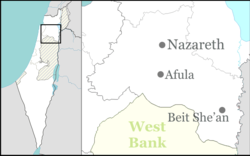Megiddo Junction bus bombing
| Megiddo Junction bus bombing | |
|---|---|
| Part of the Second Intifada militancy campaign | |
| Location | Israel |
| Coordinates | 32°34′22″N 35°11′31″E / 32.57278°N 35.19194°E |
| Date | June 5, 2002 7:15 am (GMT+2) |
Attack type | suicide bombing |
| Deaths | 13 Israeli soldiers and four civilians (+ 1 bomber) |
| Injured | 43 Israelis (mostly soldiers) |
| Perpetrators | Islamic Jihad claimed responsibility |

The Megiddo Junction bus bombing was the suicide bombing of an Egged bus at Megiddo Junction in northern Israel on June 5, 2002. 17 people were killed and 43 wounded, the majority of them IDF soldiers.
The Palestinian Islamist militant organization Islamic Jihad claimed responsibility for the attack.
The attack
On Wednesday, 5 June 2002, a Palestinian suicide bomber drove a Renault van loaded with dozens of kilograms of explosives to Highway 65. At Megiddo Junction, he approached Egged bus no. 830, filled with passengers, traveling from Tel Aviv to Tiberias. At 7:15 am, the bomber detonated the explosive device near the fuel tank of the bus, causing it to burst into flames.[1] According to a member of the rescue crew, people were thrown out of the bus by the force of the bomb and rescuers could not board the vehicle immediately due to the extreme heat.[2]
The blast killed 13 Israeli soldiers and four civilians.[3] 43 passengers were injured, most of them soldiers.[4]
Fatalities
|
|
Perpetrators and retaliation
After the attack the Palestinian Islamist militant organization Islamic Jihad claimed responsibility for the attack and stated that the attack was carried out by an 18-year-old Palestinian named Hamza Samudi who originated from Jenin and had taken driving lessons four days before the attack, especially for this mission. In response, Israeli forces put Yasser Arafat under siege in his Ramallah compound once again.[22]
References
- ^ Suicide bombing at Megiddo junction
- ^ "Israel bus attack kills 17". BBC News. June 5, 2002.
- ^ James Bennet (June 8, 2002). "In Israeli Bed, Failed Bomber Tells of 'Love of Martyrdom'". The New York Times.
- ^ Suicide bombing at Megiddo junction - 5-Jun-2002 Israel Ministry of Foreign Affairs
- ^ Cpl Liron Avitan
- ^ Cpl Avraham Barzilai
- ^ Cpl Dennis Blumin
- ^ St-Sgt Eliran Buskila
- ^ St-Sgt Zvi Gelberd
- ^ Sgt Violetta Hizgayev
- ^ St-Sgt Ganadi Issakov
- ^ Sgt Sariel Katz
- ^ Cpl Vladimir Morari
- ^ Sergeant Yigal Nedipur, 22 - Haaretz
- ^ Sgt Dotan Reisel
- ^ St-Sgt David Stanislavksy
- ^ Sgt Sivan Wiener
- ^ Zion Agmon
- ^ Adi Dahan
- ^ Shimon Timsit
- ^ Eliyahu Timsit
- ^ Israelis leave Arafat compound after raid. CNN, 6 June 2002
External links
- Suicide bombing at Megiddo junction - 5-Jun-2002 - published at the Israeli Ministry of Foreign Affairs
- Israel bus attack kills 17 - BBC News, June 5, 2002
- Bomb Kills 17 Israeli Bus Passengers - Fox News, June 5, 2002
- Israel enters Jenin after suicide blast - BBC News June 5, 2002
- The Armageddon bomb - The Economist June 5, 2002
- Mass murder in 2002
- Attacks on buses by Palestinian militant groups
- Palestinian terrorism
- Palestinian suicide bomber attacks against buses
- Terrorist attacks attributed to Palestinian militant groups
- Terrorist incidents in Israel in 2002
- Suicide car and truck bombings in Israel
- June 2002 events in Asia
- Islamic terrorism in Israel

